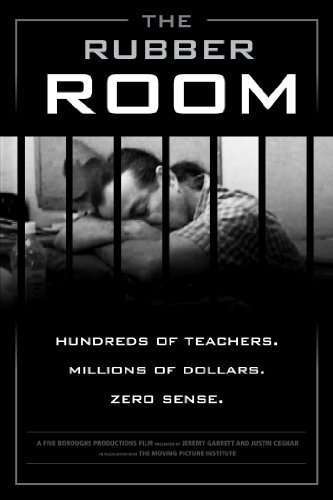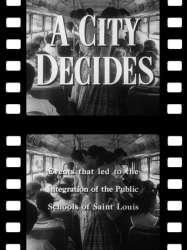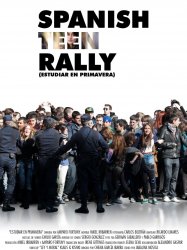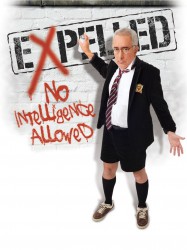Rubber Room est un film américain de genre Documentaire
Rubber Room (2012)

Si vous aimez ce film, faites-le savoir !
- Infos
- Casting
- Infos techniques
- Photos
- Vidéos
- Passages TV
- Citations
- Personnages
- Musique
- Récompenses
The Rubber Room is a 2010 documentary film about the reassignment centers run by the New York City Department of Education, which the filmmakers claim exist in various forms in school districts across the United States. Allegedly intended to serve as temporary holding facilities for teachers accused of various kinds of misconduct who are awaiting an official hearing, these reassignment centers have become known amongst the "exiled" teachers subculture as "rubber rooms", so named after the padded cells of psychiatric hospitals.
Commentaires
Postez un commentaire :
Suggestions de films similaires à Rubber Room
Il y a 8959 ayant les mêmes genres cinématographiques, 9025 films qui ont les mêmes thèmes (dont 8 films qui ont les mêmes 4 thèmes que Rubber Room), pour avoir au final 70 suggestions de films similaires.Si vous avez aimé Rubber Room, vous aimerez sûrement les films similaires suivants :

A City Decides (1956)
, 27minutesRéalisé par Charles Guggenheim
Origine Etats-Unis
Genres Documentaire
Thèmes Le thème de l'éducation, Le racisme, Documentaire sur la discrimination, Documentaire sur le droit, Documentaire historique, Documentaire sur une personnalité, Documentaire sur la politique, Politique
Note64%






Estudiar en primavera (2014)
, 53minutesGenres Documentaire
Thèmes Le thème de l'éducation, Documentaire sur le droit, Documentaire historique, Documentaire sur une personnalité, Documentaire sur la politique, Politique
Note83%






The Revisionaries (2012)
, 1h32Origine Etats-Unis
Genres Documentaire
Thèmes Le thème de l'éducation, Documentaire historique, Documentaire sur la politique, Politique
Note69%






Precious Knowledge (2010)
Origine Etats-Unis
Genres Documentaire
Thèmes Le thème de l'éducation, Documentaire historique, Documentaire sur la politique, Politique
Note78%






Waiting for Superman (2010)
, 1h42Réalisé par Davis Guggenheim
Origine Etats-Unis
Genres Documentaire
Thèmes Le thème de l'éducation, L'enfance, Documentaire historique, Documentaire sur une personnalité, Documentaire sur la politique, Politique
Acteurs George Reeves
Note73%





Documentaire sur l'état catastrophique du système éducatif américain.Davis Guggenheim part à la rencontre des élèves et de leurs parents, mais aussi des professeurs et membres de ce système qui essayent, jour après jour, de l'améliorer.

The Texas Promise (2015)
, 1h39Origine Etats-Unis
Genres Documentaire
Thèmes Le thème de l'éducation, Documentaire historique, Documentaire sur la politique, Politique
When Texas cut $5.4 billion from public schools, it affected 5 million students and made Texas 49th in the country in per pupil spending. The Texas Promise follows the debate over the direction of Texas public education and its impact on the nation. With a lawsuit brought against the state by a collection of school districts claiming that the cutting of over 5 billion dollars from public education was unconstitutional, and a variety of contested bills up for passage in the 83rd Legislature, the film explores what is at stake for students in the Texas school system and what the policy decisions might mean for the future of Texas.

Indoctrinate U (2007)
, 2hRéalisé par Evan Coyne Maloney
Origine Etats-Unis
Genres Documentaire
Thèmes Le thème de l'éducation, Documentaire historique, Documentaire sur la politique, Politique, Langues et la traduction
Acteurs Evan Coyne Maloney
Note69%





 , 1h37
, 1h37Origine Etats-Unis
Genres Documentaire
Thèmes Le thème de l'éducation, Documentaire historique, Documentaire sur la politique, Politique
Acteurs Ben Stein
Note37%






Flower in the Gun Barrel (2008)
Origine Etats-Unis
Genres Documentaire
Thèmes Afrique post-coloniale, Le racisme, Documentaire sur la discrimination, Documentaire sur le droit, Documentaire sur la guerre, Documentaire historique, Documentaire sur une personnalité, Documentaire sur la politique, Politique
Note80%





To a large extent, the film consists of interviews with genocide survivors, many of whom were children in 1994. In all, over thirty survivors, perpetrators, and experts were interviewed for the film. In these interviews, the survivors discuss what it means to be a Rwandan and to live next door to people who killed their families. The survivors describe how they deal with their country's request that they forgive one another and move on, so that Rwanda can rebuild and unify itself. Perpetrators' views illuminate the madness that seized the culture in 1994; exploring the experience of apologizing to victims, and examining what it is like to be looked at as a murderer in Rwandan society.

Darfur Now (2007)
, 1h38Réalisé par Ted Braun
Origine Etats-Unis
Genres Documentaire, Policier
Thèmes Afrique post-coloniale, L'immigration, Documentaire sur le droit, Documentaire sur la guerre, Documentaire historique, Documentaire sur une personnalité, Documentaire sur la politique, Politique
Acteurs Don Cheadle, George Clooney, Arnold Schwarzenegger
Note66%





 Connexion
Connexion